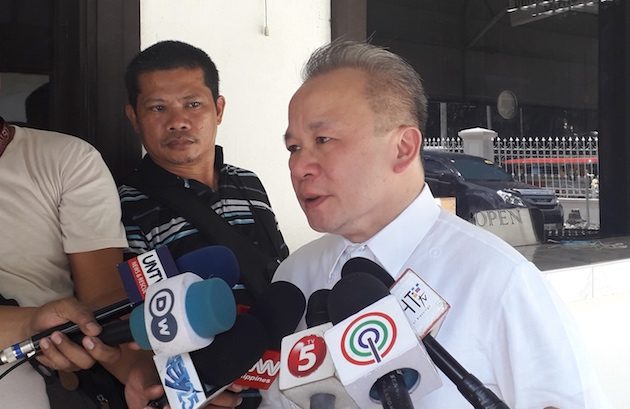SUMMARY
This is AI generated summarization, which may have errors. For context, always refer to the full article.

MANILA, Philippines (UPDATED) – Journalists from competing news outfits showed solidarity on Tuesday, April 30, as 41 reporters, columnists, and anchors from different media organizations filed a petition for intervention asking the Supreme Court (SC) to end President Rodrigo Duterte’s coverage ban against Rappler and its reporters and correspondents.
The petition for intervention asks the SC to hold oral arguments. The journalists first need to seek SC permission to intervene through a motion for leave, in which they have to defend their legal standing to join the petition.
Prepared by former SC spokesman and human rights lawyer Ted Te of the Free Legal Assistance Group, the petition for intervention argues that Duterte’s ban can extend to the 41 journalists, or any journalist for that matter, should their content be regarded as “fake news” by the President or Malacañang. (STATEMENT: With Rappler ban, Duterte also violates public right to know)
Among those who signed the petition for intervention are ABS-CBN News Channel (ANC) anchor Tina Monzon-Palma; Solita “Winnie” Monsod, currently a presenter for GMA News and Public Affairs and columnist of the Philippine Daily Inquirer; Lourd de Veyra, currently a presenter for One News; Inquirer columnist John Nery, former editor-in-chief of Inquirer.net; and Melinda de Jesus, Vergel Santos, and Luis Teodoro of the Center for Media Freedom and Responsibility.
Dozens of other journalists from both television and print outfits also signed, including current and former members of the Malacañang Press Corps and young reporters covering the metro and police beats.
Legal standing
“The ban articulated by the President in his March 1, 2018, speech is already in place and it extends not only to Rappler and to its reporters and staff but also to any journalist who would write or broadcast anything that the President deems to be ‘fake news,'” said the petition.
Duterte’s ban against Rappler started on February 20, 2018, when the Presidential Security Group barred Rappler reporter Pia Ranada from entering Malacañang. Now in effect for 14 months, the ban has extended to all public events where Duterte is present and covers all Rappler reporters and correspondents.
Since February 2018, there have been 8 other instances where Rappler reporters, aside from Ranada, were kicked out of coverages, the most recent being the prohibition against Rappler reporter Sofia Tomacruz from covering the April 23 “End Tuberculosis” event of the Department of Health. Duterte was in attendance.
Further explaining the petition, Te said: “The fact that there are reporters who are afraid, who are hesitant, who doubt when they write or report, that’s already the essence of the chill. It is prior restraint, and prior restraint is always constitutionally impermissible.”
The petition pointed out to the SC that Duterte and Malacañang had provided different reasons for the ban, showing that the President was merely acting on “caprice and whim” which, the petition said, “by any standard [is] constitutive of grave abuse of discretion.”
“As journalists and/or broadcasters, petitioners-in-intervention are clearly entitled to the Freedom of the Press under Section 4, Article III of the 1987 Constitution. The guarantee prohibits any law from being passed that ‘abridges’ press freedom. In the same vein, it also prohibits overbearing and over expansive exercise of executive power that trenches on press freedom,” said the petition.
‘Timely’
Te said the petition for intervention is “timely” given the Duterte administration’s hostility towards the press.
“It’s been a year since the ban but I think if you trace the evolution of the ban, what’s difficult is that the ban was not written, it depends what President Duterte says. That’s what’s difficult. It appears to evolve, it appears to change every time there’s a speech…. I think it should be time that the Court rules on it,” Te said.
The main petition, a petition for certiorari, was filed by Ranada and 7 other Rappler reporters and correspondents on April 11.
A significant press freedom test case under the Duterte administration, Rappler argues that the coverage ban is a violation of the constitutional guarantees of a free press, free speech, equal protection, and due process.
Both the main petition and the petition for intervention argue that the ban constitutes prior restraint, which the SC has repeatedly disallowed for abridging freedom of expression.
“It must be noted that the President is not without legal recourse against false or malicious reporting or broadcasts. The law provides ample remedies against this. Judicial notice may be taken of a former president who availed herself of precisely such a remedy. Thus, personal displeasure at news reporting does not justify a wholesale ban against coverage,” said the petition. – Rappler.com
Add a comment
How does this make you feel?
There are no comments yet. Add your comment to start the conversation.